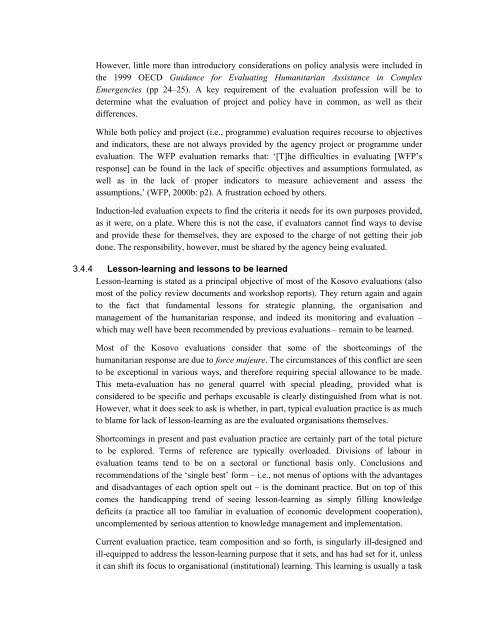Download PDF - ReliefWeb
Download PDF - ReliefWeb
Download PDF - ReliefWeb
You also want an ePaper? Increase the reach of your titles
YUMPU automatically turns print PDFs into web optimized ePapers that Google loves.
However, little more than introductory considerations on policy analysis were included in<br />
the 1999 OECD Guidance for Evaluating Humanitarian Assistance in Complex<br />
Emergencies (pp 24–25). A key requirement of the evaluation profession will be to<br />
determine what the evaluation of project and policy have in common, as well as their<br />
differences.<br />
While both policy and project (i.e., programme) evaluation requires recourse to objectives<br />
and indicators, these are not always provided by the agency project or programme under<br />
evaluation. The WFP evaluation remarks that: ‘[T]he difficulties in evaluating [WFP’s<br />
response] can be found in the lack of specific objectives and assumptions formulated, as<br />
well as in the lack of proper indicators to measure achievement and assess the<br />
assumptions,’ (WFP, 2000b: p2). A frustration echoed by others.<br />
Induction-led evaluation expects to find the criteria it needs for its own purposes provided,<br />
as it were, on a plate. Where this is not the case, if evaluators cannot find ways to devise<br />
and provide these for themselves, they are exposed to the charge of not getting their job<br />
done. The responsibility, however, must be shared by the agency being evaluated.<br />
3.4.4 Lesson-learning and lessons to be learned<br />
Lesson-learning is stated as a principal objective of most of the Kosovo evaluations (also<br />
most of the policy review documents and workshop reports). They return again and again<br />
to the fact that fundamental lessons for strategic planning, the organisation and<br />
management of the humanitarian response, and indeed its monitoring and evaluation –<br />
which may well have been recommended by previous evaluations – remain to be learned.<br />
Most of the Kosovo evaluations consider that some of the shortcomings of the<br />
humanitarian response are due to force majeure. The circumstances of this conflict are seen<br />
to be exceptional in various ways, and therefore requiring special allowance to be made.<br />
This meta-evaluation has no general quarrel with special pleading, provided what is<br />
considered to be specific and perhaps excusable is clearly distinguished from what is not.<br />
However, what it does seek to ask is whether, in part, typical evaluation practice is as much<br />
to blame for lack of lesson-learning as are the evaluated organisations themselves.<br />
Shortcomings in present and past evaluation practice are certainly part of the total picture<br />
to be explored. Terms of reference are typically overloaded. Divisions of labour in<br />
evaluation teams tend to be on a sectoral or functional basis only. Conclusions and<br />
recommendations of the ‘single best’ form – i.e., not menus of options with the advantages<br />
and disadvantages of each option spelt out – is the dominant practice. But on top of this<br />
comes the handicapping trend of seeing lesson-learning as simply filling knowledge<br />
deficits (a practice all too familiar in evaluation of economic development cooperation),<br />
uncomplemented by serious attention to knowledge management and implementation.<br />
Current evaluation practice, team composition and so forth, is singularly ill-designed and<br />
ill-equipped to address the lesson-learning purpose that it sets, and has had set for it, unless<br />
it can shift its focus to organisational (institutional) learning. This learning is usually a task
















![CynefinFramework final [Read-Only]](https://img.yumpu.com/19017304/1/190x135/cynefinframework-final-read-only.jpg?quality=85)